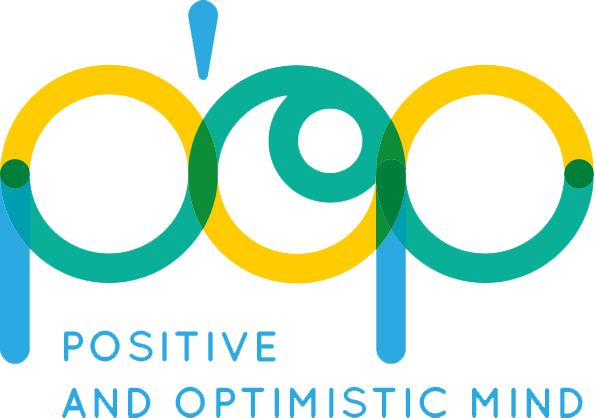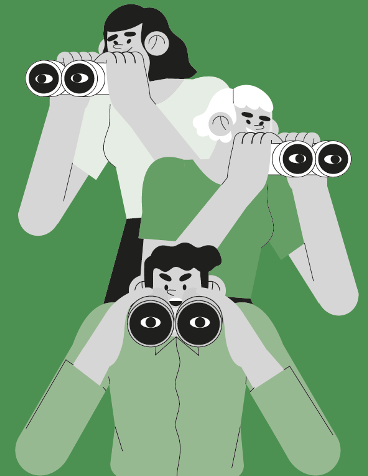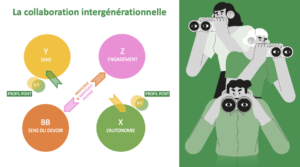Conference delivered by Béatrix Charlier in April 2025, opening the Leadership Mornings series organized by the Ministry of National Education, Children and Youth – Directorate-General for the Childhood Sector, Service for Education and Care.
When Differences Become Bonds: Generational Reconciliation
When several generational profiles coexist within a team, it means just as many management styles. Of course, tensions exist. The word “boomer” sometimes flies around, Gen X find Gen Y too questioning, and Zoomers too impatient or disloyal. But these frictions, far from being an obstacle, can become sparks of creativity. Because it is not age that matters: it is the way each person sees the world.
And this world is changing fast. By 2030, 65% of jobs do not yet exist, half of today’s skills will be obsolete within two years, and only 13% of European employees report being engaged, according to Gallup. Disengagement, meanwhile, costs an average of €12,600 per employee per year. Faced with such turbulence, intergenerational collaboration is no longer an option: it is a necessity.
Generations, but above all Systems of Values
At P’OP, our research over more than ten years shows that a generational profile cannot be reduced to a date of birth, but rather to a worldview, a system of values. Baby Boomers carry a strong sense of duty, Generation X values anchoring and autonomy, Generation Y seeks meaning, and Generation Z embodies the urgency of change.
These differences became even more pronounced after 2020, in a world that turned FANI (fragile, anxious, non-linear, incomprehensible). Covid, lockdowns, and both social and personal upheavals reshaped every generation. Even when they share the same educational values, they no longer approach collaboration in the same way. Recognizing this reality is essential to manage with professionalism and coherence.
A Concrete Example in a Maison Relais
One morning in a maison relais in Esch-sur-Alzette:
-
Monique, a Baby Boomer educator, ensures each activity is carefully planned and that children feel secure.
-
Carlo, Generation X, takes the initiative to reorganize the outdoor space for play, without waiting for formal approval.
-
Sophie, Generation Y, insists that new activities foster inclusion for multilingual children: “Every child must find meaning in what we do.”
-
Lina, a Generation Z trainee, suggests creating a quick online survey for parents’ feedback and films a short video to share daily life with families.
Each acts according to generational reflexes. Yet instead of blocking each other, the team combines strengths: Monique’s rigor, Carlo’s autonomy, Sophie’s sense of purpose, and Lina’s digital agility. Together, they build a more inclusive and better-connected educational project for families.
A Challenge, but also an Opportunity for Leaders
Why is managing multigenerational teams both a challenge and an opportunity?
-
It’s a challenge if we remain prisoners of stereotypes or attempt to micromanage every style, risking unfairness.
-
But it’s an opportunity if we know how to identify generational profiles and individual talents. Frictions then become sources of innovation. When things “sting,” they can spark interesting ideas. When the gap is wide—between Boomers and Gen Z—it creates openings for mentorship and reverse mentoring, that reciprocal exchange where each learns from the other.
Clashes between Gen X and Gen Y also give rise to “bridge profiles”: people who, after repeated misunderstandings, end up truly understanding one another. They “mutate” without renouncing their identity, becoming natural mediators and facilitators. They fluidify teamwork and transform opposition into connection. They remind us that contact with difference does not erase our identity—it expands it.
The Special Role of Education and Luxembourg
In the field of education, this work takes on a special resonance: teams must manage not only their own diversity, but also that of the children and families they serve.
In Luxembourg, a multicultural country par excellence, this intercultural dimension naturally adds to the intergenerational one. It reminds us that what unites us is not our age, but our shared will to create meaningful impact where we work and serve.
Growing Together
Generational reconciliation is not only a management challenge: it is a key to cohesion. It paves the way to more diversity, cultural inclusion, and personal enrichment.
In organizations that deal daily with the complexity of children, parents, and teams, this becomes a precious resource. Because working with those who think differently broadens our perspective, strengthens our support for families… and helps us grow together.
Everyone has a role to play, a contribution to give, an energy to share!
Brené Brown reminds us:
“Connection is why we’re here; it gives purpose and meaning to our lives.”
👉 At P’OP, we don’t just detect talents—we also identify generational profiles and their potential evolutions. Because a generational profile is not simply about age, but about how you relate to the world and the unique way you connect to others.
And you—do you want to discover your generational profile?
Are you more of a mentor, a bridge profile, or a change pioneer?
By knowing this, you can transform differences into real levers of collaboration and impact.
***
Version in German 🇩🇪
When Differences Become Connections: Generational Reconciliation
When several generational profiles work together in a team, it means just as many different work and communication styles. Naturally, tensions arise. Sometimes the word “Boomer” is used, Generation X finds Generation Y too defiant, and Zoomers too impatient or disloyal. However, these frictions are by no means just an obstacle – they can spark creative ideas. Because what matters is not age, but the way each person views the world.
And this world is changing rapidly: 65% of jobs in 2030 do not yet exist today, half of current skills will be obsolete in two years, and only 13% of European employees consider themselves engaged, according to Gallup. Lack of engagement costs an average of €12,600 per employee per year. Given these upheavals, intergenerationality is no longer an option – it is a necessity.
Generations – but above all, Systems of Values
Our research at P’OP over more than ten years shows that a generational profile cannot be reduced solely to a date of birth. Rather, it is about an attitude towards the world, a system of values.
-
Baby Boomers carry a sense of duty and responsibility,
-
Generation X, the need for stability and autonomy,
-
Generation Y, the search for meaning,
-
and Generation Z, the urgency of change.
These differences became even clearer after 2020 – in a world that has become FANI: fragile, anxiety-inducing, non-linear, and difficult to understand. The Covid crisis, lockdowns, and social or personal upheavals have shaped all generations. Even if they share the same educational values, they approach collaboration in very different ways. Recognizing this reality is crucial for professional and coherent management.
A Concrete Example from a Maison Relais
One morning in a Maison Relais in Esch-sur-Alzette:
-
Monique, educator (BB), ensures that every activity is well planned and that the children have a safe environment.
-
Carlo, Generation X, independently reorganizes the outdoor area to facilitate play – without waiting for formal approval from management.
-
Sophie, Generation Y, insists that new activities also promote the integration of multilingual children: “Every child must find meaning in what we do.”
-
Lina, an intern from Generation Z, suggests conducting a small online survey among parents and creates a short video to bring the children’s daily life closer to families.
Each acts according to their own generational reflexes. However, instead of blockages, synergies emerge: Monique’s reliability, Carlo’s autonomy, Sophie’s sense of purpose, and Lina’s digital agility together result in a more inclusive and family-oriented educational project.
Challenge – but also an Opportunity for Leaders
So why can managing teams with different generational profiles be both an obstacle and an opportunity?
-
It is an obstacle if one remains stuck in stereotypes or tries to control every style through micromanagement – with the risk of creating injustices.
-
It is an opportunity if one recognizes these profiles and aligns collaboration towards a common goal. Frictions then become sources of innovation. When there’s a “spark,” exciting ideas can emerge. And when the gap is wide – for example, between BB and Gen Z – the door opens for mentoring and reverse mentoring, that famous give-and-take where everyone learns from each other.
From the confrontations between X and Y also emerge “bridge profiles”: people who, after many misunderstandings and disputes, move towards each other and develop further without giving up their own identity. They become natural mediators who harmonize teams and transform opposites into connections. They remind us: In contact with differences, we do not lose our self – we expand it.
The Special Role of Education – and Luxembourg
In educational professions, this work takes on a special significance: Teams must not only deal with their own diversity, but also with that of the children and families they accompany.
In Luxembourg, the multicultural country par excellence, the intercultural dimension naturally complements the intergenerational one. It reminds us that it is not age that unites us, but the common will to achieve impact – where we work and operate.
Growing Together
Generational reconciliation is not just a management task – it is a key to greater cohesion. It opens the way to more diversity, cultural inclusion, and personal enrichment.
Especially in organizations that deal daily with the complexity of children, parents, and teams, this becomes a valuable resource. Working with people who think differently broadens our perspective, strengthens our support for families – and allows us to grow together.
Everyone has a contribution to make, energy to bring, talent to share!
The American researcher Brené Brown reminds us:
“Connection is why we are here.”
👉 At P’OP, we not only recognize talents, but also generational profiles and their potential development. Because a generational profile is not simply a question of age, but of how one connects with the world.
And you? Would you like to discover your own generational profile? Are you more of a mentor, bridge builder, or pioneer of change?
By finding this out, you can transform differences into real levers for collaboration and impact.


